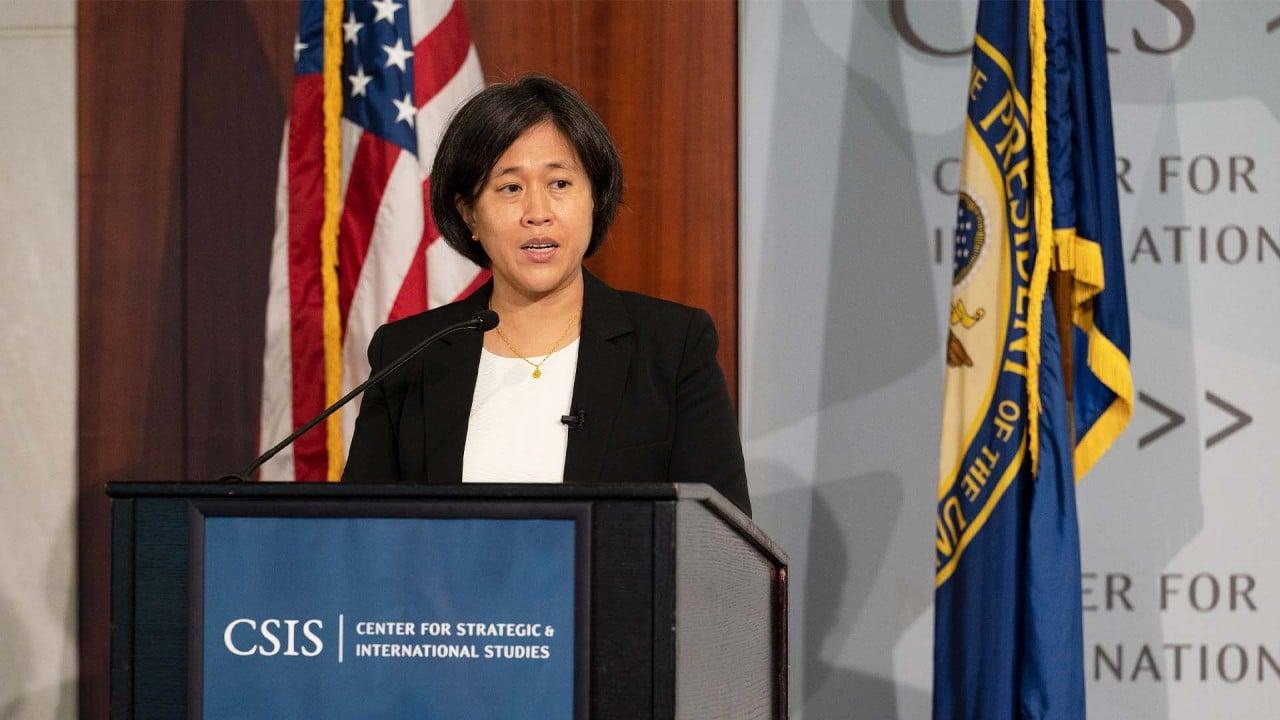
In opposition, the US Chamber of Commerce, the largest business lobby in America, released a press statement. It read: “301 tariffs hurt American families paying higher prices for everyday goods and small businesses that need to import product to meet consumer demand.”
The second phase of the USTR tariffs review, however, seeks public opinion via an electronic portal that opened last month. This is open to all viewpoints and infuses a fresh perspective. From small business owners to local branches of labour unions, grass-root voices have submitted comments on supply chain realities and offered contrarian takes that break from those of their national organisations.
President Joe Biden talks about the American Jobs Plan in Washington on April 7, 2021. Despite hopes otherwise, he has continued with Trump-era tariffs on China. Photo: Tribune News Service
Professionally, I have seen manufacturing potential in the United States derailed by the tariffs. A client looking into a billion-dollar chemical manufacturing investment in the US cancelled the plan after the tariffs were imposed, because the cost of setting up the plant using construction components from China became prohibitive.
Former president Donald Trump justified the tariffs on a promise of bringing manufacturing jobs to the US. Intuitively, tariffs seem like an answer. But the reality is that Chinese and Americans have bonds in symbiotic supply chains. In severing the link, American manufacturing jobs are lost.
The value of thriving manufacturing links between China and the US should be appreciated by both US policymakers and labour unions. A vivid case study of the principle is pieced together from several comments found on the USTR comments portal.
Railway carriage manufacturing giant CRRC Corp has a factory in Springfield, Massachusetts. The factory imports railway carriage shells from China and employs 334 people to manufacture rail vehicles for the mass transit systems of Boston, Philadelphia and Los Angeles. Two local branches of labour unions representing the Springfield factory workers have written to the USTR to ask for the removal of the tariffs to protect their jobs and spur public transit manufacturing.
The support of the union locals for CRRC in Springfield is a departure from American labour unions at the national level which tend to overlook opportunities with Chinese companies.
This unwilling attitude has carried over to the Biden administration, which has courted unions, with Tai visiting various union events during the summer. In the first phase of the USTR tariffs review, major US labour unions under the umbrella of the Labour Advisory Committee for Trade Negotiations and Trade Policy (LAC), an advisory committee to the USTR, asked for tariffs to continue, in a submission I consider vituperative.
In the two-page letter, Thomas Conway, president of United Steelworkers and chair of the LAC, echoed US political attacks on China in describing the country’s trade policies as “unfair, predatory, and protectionist”.
At the start of my cross-border legal career, I saw irrational behaviour on the part of national union leadership in the US. In 2012, I was a first-year associate working on the acquisition of a bankrupt American aviation company.
The Chinese buyer was coming to the rescue, to save all segments of the company. The International Association of Machinists and Aerospace Workers, the union representing the workers whose jobs hung in the balance, was clouded by anti-China close-mindedness and challenged the sale.
The deal was not completed and when the reorganised company re-emerged, it had lost its former glory and shut down its business jet operations, with the assembly line closed.
In the middle of the 2009 global financial crisis, I was a summer intern at a firm advising a Chinese client taking part in a consortium to acquire a distressed Michigan-based carparts supplier.
The company employed thousands of members of the United Auto Workers union, and those jobs were threatened by the financial crisis. The Chinese investment consortium stabilised the company, saved the union jobs and went on to expand the company’s global footprint.
There are plenty of examples of Chinese investors and American manufacturing workers coming together and succeeding. American union leaders should put aside their nationalist zeal and work instead on protecting jobs for their members with the help of Chinese companies.
Kai Xue is a Beijing-based corporate lawyer who advises on foreign direct investment, outbound M&A, and cross-border financing

